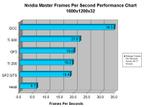|
|
 |
|
Workstation Smackdown (Nvidia Quadro DCC review) Added on: Mon Feb 04 2002 |
| Page: 1 2 3 4 5 6 7 8 9 10 11 12 13 14 15 |
Conclusions and Other Misc Thoughts, Babbles, and Ramblings
Well you�ve seen the data. Over 768 Benchmarks (Each test was run four times as explained in the benchmark article), 45 graphs, and a ridiculous number of images.
Of maybe you didn�t. Maybe you skipped to the last page to just get a single graph or conclusion, and skipped the whole article to see what my final point is.
Well since I know that many of you are going to do this, I�ve taken the liberty of creating a Master Time and Master FPS graph, showcasing the average time to complete (Less = better) and the average frames per second (more = fantastic) of each card across all the tests run. Remember if you want to see individual tests and explanations, you�ll actually have to read the article.
Quadro DCC vs ALL Master Time and Frames Per Second
 
Would you look at that, statistics actually work! The DCC comes out on top by a long shot, Maxextreme and Nvidia�s powerful accelerator decimate the lesser gaming cards. However these cheaper solutions can not be bypassed, due to the fact they�re still very powerful performers.
This article set out to do a few important things. The first of which, to demonstrate an accurate, repeatable, reproducible, real world benchmark for 3dsmax4 for the purposes of testing a variety of accelerators. The second, to demonstrate why this type of testing was done, which in turn should shed light into other testing practices of other sites. And finally, to see how the DCC and other Nvidia cards perform within 3dsmax 4.
As seen throughout the discussion and the data presented, the Quadro DCC is a powerful performer for 3dsmax. It combines a strong feature set with powerful performance and Nvidia�s legendary drivers. It provides for future design within applications by featuring programmable pixel/vertex shaders, which though available now, (Max4, Maya4, XSI 2.0 will only become more refined in the future. All of this power and expandability come at what some would consider pennies.
The Quadro DCC can be found on the web for around $670.00 USD, one of the cheapest workstation solutions currently on the market.
Because of its features, support, and cost, I give the Quadro DCC my highest recommendation for a 3dsmax workstation card. There is no better solution for the price.
I�d like to thank Brian Burke from Nvidia for giving me a chance to review this card, and make this information available to the public CGI community.
I apologize for the delay in getting this article out, but I believe it was well worth the wait. If you have any questions or comments, please feel free to email me.
|
 |
|
|



